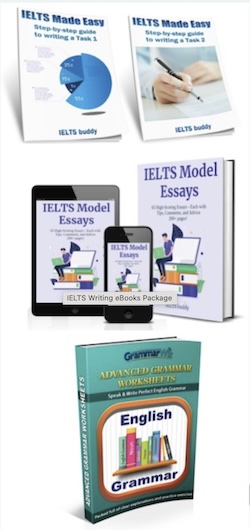- Home
- IELTS Grammar
- Infinitives
Infinitives
Infinitives are created by to + verb.
It is important that you can use them correctly in your IELTS speaking and writing as errors will affect your band score for grammar.
We have already looked at gerunds, which are verbs ending in –ing (which makes them nouns).
Take a look at this paragraph. The infinitives are in red.
To improve my IELTS score, I joined a writing class in a college in my home town. I wanted to make sure that my grammar was as good as it could be. The teachers helped me to understand some complex grammatical points. It is impossible to know everything in a short time, but I improved lot, and I would really like to thank them for what they did. To help me like this was very kind.
All these are being used in different ways. In this lesson we'll examine them further.
The Grammar
The infinitive form of the verb means that it does not take a tense. It is the bare form of the verb, but with 'to' before it.
Here are some examples
to go
to see
to wait
to manipulate
to consider
to amend
A common mistake in writing is to think of it like a finite verb (a verb that has a subject and takes a tense). It does not change its form.
Here is an example of a common mistake with the infinitive:
It took me five hours to reached the destination.
The person has made the infinitive verb, reach, in the past tense. Only the main verb (take in this case) can be given a tense.
This is how it should be written:
It took me five hours to reach the destination.
How Infinitives Are Used
As direct objects
When an infinitive is used as a direct object, it is placed after the verb:
I wanted to make sure that my grammar was as good as it could be.
I decided to study abroad, but my parents are refusing to pay.
To show purpose
They are sometimes used as a reduction of the phrase 'in order to'.
In order to improve my IELTS score, I joined a writing class in a college in my home town.
To improve my IELTS score, I joined a writing class in a college in my home town.
I joined the exercise class in order to lose weight.
I joined the exercise class to lose weight.
As a subject
To help me like this was very kind.
To get involved in charity work is a very noble cause.
However, note that the use of the gerund in these structures is much more common:
Helping me like this was very kind.
Getting involved in charity work is a very noble cause.
If you do see an infinitive at the beginning of a sentence, it is much more likely to be showing purpose i.e replacing in order to.
With phrases beginning with 'it' (it + be + infinitive)
It is impossible to be perfect in a short time.
(Adjective + Infinitive)
It could be a mistake to leave my job.
(Noun + Infinitive)
With the verb 'take' (it + take + noun + infinitive)
It took me five hours to reach the destination.
It takes a lot of concentration to read this book.
After certain adjectives
My brother was surprised to see me.
I was careful not to speak too loudly.
Verbs with the Infinitive
If you wish to put two verbs together, then the second verb will need to be an infinitive and / or gerund.
For example, you can't say this:
He hoped see me again.
He hoped seeing me again.
If "hope" is followed by another verb, it needs to be an infinitive:
He hoped to see me again.
Remember, certain verbs should be followed by an infinitive, not a gerund, and some verbs can be followed by either. For example:
I like to swim (verb + infinitive)
Or
I like swimming (verb + gerund)
Follow this link to see the lesson on gerunds or learn when you can use the gerund and infinitive.
Here is a list of verbs that are very commonly followed by an infinitive (not a gerund):
| VERB | |
|---|---|
| afford | I can't afford to pay for IELTS lessons. |
| agree | He agreed to postpone his test. |
| appear | Obesity appears to be getting worse. |
| ask | He asked me to go with him. |
| claim | She claimed to have the answer to the question. |
| decide | My partner and I decided to move house next year. |
| demand | I demand to see the manager! |
| deserve | I didn't deserve to get a 7.5 as I studied very little. |
| expect | She expected to get a band 5 but she got a 6. |
| fail | Her son failed to win the race, but he came second. |
| forget | I forgot to take the rubbish out last night. |
| hesitate | She wouldn't hesitate to help a friend in need. |
| hope | I hope to leave by 7pm. |
| intend | The government intends to hold an election in June. |
| learn | I've learnt to take each day as it comes. |
| manage | She managed to change her doctors appointment. |
| mean | Sorry, I didn't mean to arrive so late. |
| need | I need to get a band 7 to get into Australia. |
| offer | I offered to drive her to the airport. |
| plan | I plan to emigrate to the UK this year. |
| prepare | He's prepared to risk everything by investing in gold. |
| pretend | The boy pretended to fall over. |
| promise | The army general promised not to stage a coup. |
| refuse | He is refusing to take the medicine. |
| seem | She seemed to be ok yesterday, but now she is worse. |
| tend | I tend to find that warmer weather makes me feel better. |
| threaten | The country threatened to invade its neighbour. |
| wait | I can't wait to go on holiday. |
| want | The teacher wanted the students to pass. |
Adjectives and Nouns with the Infinitive
The next tables show you some common ways that adjectives and nouns are used with the infinitive.
Common adjectives preceded by
it + be and followed by infinitive
| ADJECTIVE | |
|---|---|
| bad | It is bad to gossip about your friends. |
| dangerous | It is dangerous to drive too fast. |
| difficult | It was difficult to do well in the IELTS reading test. |
| easy | It is very easy to forget important grammar points in a test. |
| fun | It isn't always fun to learn English. |
| hard | It is always hard to remain focused on your goals in life. |
| important | It is important to believe in your abilities. |
| impossible | It will be impossible for the charity to help everyone. |
| interesting | It is interesting to find out about another country. |
| necessary | It is sometimes necessary to change your plans. |
| relaxing | It is relaxing to lie in the sun. |
Common nouns preceded by
it + be and followed by infinitive
| NOUN | |
|---|---|
| a good idea | It isn't a good idea to study late at night. |
| a bad idea | It is a bad idea to spend too long on IELTS Task 1. |
| a mistake | It is a mistake to say very little in the IELTS speaking test. |
| a pity | It was a pity to leave so early. |
| a shame | It was a shame to break up. |
| a waste | It will be a waste to throw the food away. |
Common adjectives
followed by infinitives
| ADJECTIVE | |
|---|---|
| ashamed | I'm ashamed to admit that I stole the bike. |
| bound | He is bound (certain) to arrive late - he always does. |
| careful | He was careful not to wake the baby. |
| excited | I'm excited to join the local football team. |
| glad | I'm glad to hear that you are feeling better. |
| happy | The developer was happy to reduce the price of the house. |
| lucky | I'm lucky to have so many friends. |
| pleased | The nurse was pleased to know he was well again. |
| proud | She was proud to be seen with her father. |
| relieved | The police were relieved to arrest the criminal at last. |
| reluctant | I'm reluctant to take the IELTS test again. |
| sad | He was sad to see his brother leave. |
| shocked | I was shocked to find out he had been fired. |
| sorry | We'll all be sorry to see you go. |
| surprised | They were surprised to hear he is 50 years old. |
| sure | He's sure to win first prize. |
| willing | I'm willing to bet you can get a high IELTS score. |
Test yourself in a quiz - gerund and infinitive exercises
Comments
Any comments or questions about this page or about IELTS? Post them here. Your email will not be published or shared.













